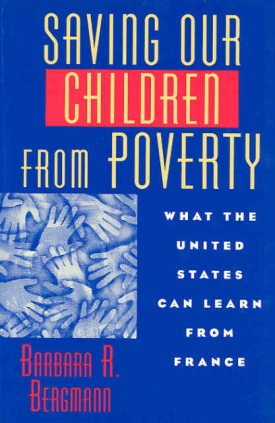
Saving Our Children From Poverty
About This Book
More than one in five American children live below the poverty line, a proportion that exceeds that of any other advanced nation. Although large numbers of Western European children live with single or unemployed parents, or belong to disadvantaged minorities, they are better shielded from severe deprivation by carefully designed public assistance programs. Saving Our Children from Poverty describes one of the most successful European systems of assistance for families, that of France, and through comparison with American programs offers a valuable guide to improving our own safety net for children and reforming our dysfunctional welfare system.
Saving Our Children from Poverty details the array of benefits available to both high- and low-income families in France. Government-run nursery schools provide free, high-quality care for almost all children between the ages of three and six. Children also receive guaranteed medical care under a national health insurance plan. The French system offers married couples most of the same benefits as single parents, and creates strong incentives to seek and hold jobs rather than remain on welfare. A French single mother who chooses to work still receives substantial income supplements, housing assistance, subsidized health care, and access to public child care facilities. In stark contrast, her American counterpart loses most of her cash benefits if she takes a job and receives no government assistance with child care. Because American policies focus disproportionately on aiding the poorest non-working families, parents forced to rely on low-wage jobs are frequently left without the resources to provide their children with an adequate standard of living.
As the public debate on welfare reform continues to rage, ever more American children fall into poverty. Why does the nation remain so unresponsive to their plight? Saving Our Children from Poverty probes the American aversion to national assistance programs, citing the negative attitudes that have seeped into the current political discourse. A lack of faith in the federal government's administrative abilities has bolstered a trend toward decentralization of programs, as well as a growing resistance to taxation. Racial antipathies and a belief that financial support encourages irresponsibility further undermine the development of programs for those in need.
Saving Our Children from Poverty illustrates what a nation no wealthier than ours can realistically accomplish and afford, and concludes with a viable blueprint for successfully applying aspects of France's system to the United States.
BARBARA R. BERGMANN is professor of economics at American University, Washington, D.C.
Download
RSF Journal
View Book Series
Sign Up For Our Mailing List
Apply For Funding
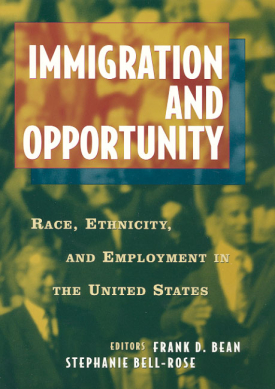
Immigration and Opportunity
About This Book
The American dream of equal opportunity and social mobility still holds a powerful appeal for the many immigrants who arrive in this country each year. but if immigrant success stories symbolize the fulfillment of the American dream, the persistent inequality suffered by native-born African Americans demonstrates the dream's limits. Although the experience of blacks and immigrants in the United States are not directly comparable, their fates are connected in ways that are seldom recognized. Immigration and Opportunity brings together leading sociologists and demographers to present a systematic account of the many ways in which immigration affects the labor market experiences of native-born African Americans.
With the arrival of large numbers of nonwhite immigrants in recent decades, blacks now represent less than 50 percent of the U.S. minority population. Immigration and Opportunity reveals how immigration has transformed relations between minority populations in the United States, creating new forms of labor market competition between native and immigrant minorities. Recent immigrants have concentrated in a handful of port-of-entry cities, breaking up established patterns of residential segregation,and, in some cases, contributing to the migration of native blacks out of these cities. Immigrants have secured many of the occupational niches once dominated by blacks and now pass these jobs on through ethnic hiring networks that exclude natives. At the same time, many native-born blacks find jobs in the public sector, which is closed to those immigrants who lack U.S. citizenship.
While recent immigrants have unquestionably brought economic and cultural benefits to U.S. society, this volume makes it clear that the costs of increased immigration falls particularly heavily upon those native-born groups who are already disadvantaged. Even as large-scale immigration transforms the racial and ethnic make-up of U.S. society—forcing us to think about race and ethnicity in new ways—it demands that we pay renewed attention to the entrenched problems of racial disadvantage that still beset native-born African Americans.
FRANK D. BEAN is professor of sociology and director of the Immigration Policy Research Project at the University of California, Irvine.
STEPHANIE BELL-ROSE was formerly legal counsel and program officer at the Andrew W. Mellon Foundation.
CONTRIBUTORS: Richard D. Alba, Barry Edmonston, Walter C. Farrell Jr., Mark A. Fossett, William H. Frey, Jennifer E. Glick, Jomas H. Johnson, Karen D. Johnson-Webb, John R. Logan, Jeffrey S. Passel, Alejandro Portes, Michael J. Rosenfeld, Marta Tienda, Jennifer Van Hook, Roger Waldinger, Mary C. Water, Michael J. White, Franklin D. Wilson, Min Zhou.
RSF Journal
View Book Series
Sign Up For Our Mailing List
Apply For Funding
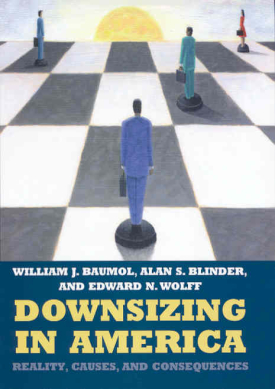
Downsizing in America
About This Book
In the 1980s and early 1990s, a substantial number of U.S. companies announced major restructuring and downsizing. But we don't know exactly what changes in the U.S. and global economy triggered this phenomenon. Little research has been done on the underlying causes of downsizing. Did companies actually reduce the size of their workforces, or did they simply change the composition of their workforces by firing some kinds of workers and hiring others? Downsizing in America, one of the most comprehensive analyses of the subject to date, confronts all these questions, exploring three main issues: the extent to which firms actually downsized, the factors that triggered changes in firm size, and the consequences of downsizing.
The authors show that much of the conventional wisdom regarding the spate of downsizing in the 1980s and 1990s is inaccurate. Nearly half of the large firms that announced major layoffs subsequently increased their workforce by more than 10 percent within two or three years. The only arena in which downsizing predominated appears to be the manufacturing sector-less than 20 percent of the U.S. workforce.
Downsizing in America offers a range of compelling hypotheses to account for adoption of downsizing as an accepted business practice. In the short run, many companies experiencing difficulties due to decreased sales, cash flow problems, or declining securities prices reduced their workforces temporarily, expanding them again when business conditions improved. The most significant trigger leading to long-term downsizing was the rapid change in technology. Companies rid themselves of their least skilled workers and subsequently hired employees who were better prepared to work with new technology, which in some sectors reduced the size of firm at which production is most efficient.
Baumol, Blinder, and Wolff also reveal what they call the dirty little secret of downsizing: it is profitable in part because it holds down wages. Downsizing in America shows that reducing employee rolls increased profits, since downsizing firms spent less money on wages relative to output, but it did not increase productivity. Nor did unions impede downsizing. The authors show that unionized industries were actually more likely to downsize in order to eliminate expensive union labor. In sum, downsizing transferred income from labor to capital-from workers to owners.
Downsizing in America combines an investigation of the underlying realities and causes of workforce reduction with an insightful analysis of the consequent shift in the balance of power between management and labor, to provide us with a deeper understanding of one of the major economic shifts of recent times—one with far-reaching implications for all American workers.
WILLIAM J. BAUMOL is professor of economics, New York University.
ALAN S. BLINDER is Gordon S. Rentschler Memorial Professor of Economics, Princeton University.
EDWARD N. WOLFF is professor of economics, New York University.
RSF Journal
View Book Series
Sign Up For Our Mailing List
Apply For Funding
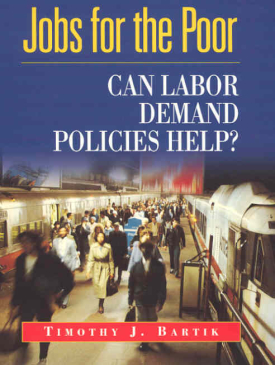
Jobs for the Poor
About This Book
Even as the United States enjoys a booming economy and historically low levels of unemployment, millions of Americans remain out of work or underemployed, and joblessness continues to plague many urban communities, racial minorities, and people with little education. In Jobs for the Poor, Timothy Bartik calls for a dramatic shift in the way the United States confronts this problem. Today, most efforts to address this problem focus on ways to make workers more employable, such as job training and welfare reform. But Bartik argues that the United States should put more emphasis on ways to increase the interest of employers in creating jobs for the poor—or the labor demand side of the labor market.
Bartik's bases his case for labor demand policies on a comprehensive review of the low-wage labor market. He examines the effectiveness of government interventions in the labor market, such as Welfare Reform, the Earned Income Tax Credit, and Welfare-to-Work programs, and asks if having a job makes a person more employable. Bartik finds that public service employment and targeted employer wage subsidies can increase employment among the poor. In turn, job experience significantly increases the poor's long-run earnings by enhancing their skills and reputation with employers. And labor demand policies can avoid causing inflation or displacing other workers by targeting high-unemployment labor markets and persons who would otherwise be unemployed.
Bartik concludes by proposing a large-scale labor demand program. One component of the program would give a tax credit to employers in areas of high unemployment. To provide disadvantaged workers with more targeted help, Bartik also recommends offering short-term subsidies to employers—particularly small businesses and nonprofit organizations—that hire people who otherwise would be unlikely to find jobs. With experience from subsidized jobs, the new workers should find it easier to obtain future year-round employment.
Although these efforts would not catapult poor families into the middle class overnight, Bartik offers a powerful argument that having a full-time worker in every household would help improve the lives of millions. Jobs for the Poor makes a compelling case that full employment can be achieved if the country has the political will and adopts policies that address both sides of the labor market.
Copublished with the W. E. Upjohn Institute for Economic Research.
TIMOTHY J. BARTIK is senior economist at the W. E. Upjohn Institute for Employment Research.
RSF Journal
View Book Series
Sign Up For Our Mailing List
Apply For Funding
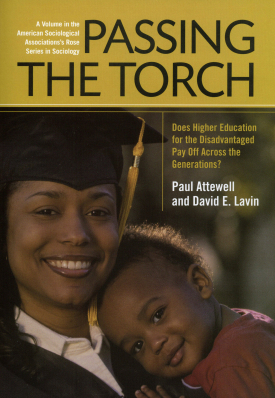
Passing the Torch
About This Book
A Volume in the American Sociological Association’s Rose Series in Sociology
Winner of the 2009 Grawemeyer Award for the Best Book in Education
Winner of the 2009 Outstanding Book Award of the American Educational Research Association
The steady expansion of college enrollment rates over the last generation has been heralded as a major step toward reducing chronic economic disparities. But many of the policies that broadened access to higher education—including affirmative action, open admissions, and need-based financial aid—have come under attack in recent years by critics alleging that schools are admitting unqualified students who are unlikely to benefit from a college education. In Passing the Torch, Paul Attewell, David Lavin, Thurston Domina, and Tania Levey follow students admitted under the City University of New York’s “open admissions” policy, tracking its effects on them and their children, to find out whether widening college access can accelerate social mobility across generations.
Unlike previous research into the benefits of higher education, Passing the Torch follows the educational achievements of three generations over thirty years. The book focuses on a cohort of women who entered CUNY between 1970 and 1972, when the university began accepting all graduates of New York City high schools and increasing its representation of poor and minority students. The authors survey these women in order to identify how the opportunity to pursue higher education affected not only their long-term educational attainments and family well-being, but also how it affected their children’s educational achievements. Comparing the record of the CUNY alumnae to peers nationwide, the authors find that when women from underprivileged backgrounds go to college, their children are more likely to succeed in school and earn college degrees themselves. Mothers with a college degree are more likely to expect their children to go to college, to have extensive discussions with their children, and to be involved in their children’s schools. All of these parenting behaviors appear to foster higher test scores and college enrollment rates among their children. In addition, college-educated women are more likely to raise their children in stable two-parent households and to earn higher incomes; both factors have been demonstrated to increase children’s educational success.
The evidence marshaled in this important book reaffirms the American ideal of upward mobility through education. As the first study to indicate that increasing access to college among today’s disadvantaged students can reduce educational gaps in the next generation, Passing the Torch makes a powerful argument in favor of college for all.
PAUL ATTEWELL and DAVID LAVIN are professors of sociology in the Graduate Center at the City University of New York.
RSF Journal
View Book Series
Sign Up For Our Mailing List
Apply For Funding
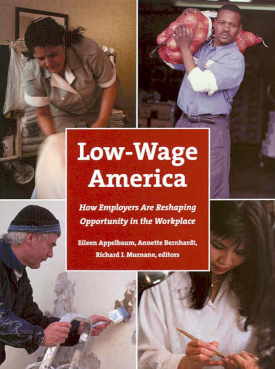
Low-Wage America
About This Book
About 27.5 million Americans—nearly 24 percent of the labor force—earn less than $8.70 an hour, not enough to keep a family of four out of poverty, even working full-time year-round. Job ladders for these workers have been dismantled, limiting their ability to get ahead in today’s labor market. Low-Wage America is the most extensive study to date of how the choices employers make in response to economic globalization, industry deregulation, and advances in information technology affect the lives of tens of millions of workers at the bottom of the wage distribution.
Based on data from hundreds of establishments in twenty-five industries—including manufacturing, telecommunications, hospitality, and health care—the case studies document how firms’ responses to economic restructuring often results in harsh working conditions, reduced benefits, and fewer opportunities for advancement. For instance, increased pressure for profits in newly consolidated hotel chains has led to cost-cutting strategies such as requiring maids to increase the number of rooms they clean by 50 percent. Technological changes in the organization of call centers—the ultimate “disposable workplace”—have led to monitoring of operators’ work performance, and eroded job ladders. Other chapters show how the temporary staffing industry has provided paths to better work for some, but to dead end jobs for many others; how new technology has reorganized work in the back offices of banks, raising skill requirements for workers; and how increased competition from abroad has forced U.S. manufacturers to cut costs by reducing wages and speeding production.
Although employers’ responses to economic pressures have had a generally negative effect on frontline workers, some employers manage to resist this trend and still compete successfully. The benefits to workers of multi-employer training consortia and the continuing relevance of unions offer important clues about what public policy can do to support the job prospects of this vast, but largely overlooked segment of the American workforce. Low-Wage America challenges us to a national self-examination about the nature of low-wage work in this country and asks whether we are willing to tolerate the profound social and economic consequences entailed by these jobs.
EILEEN APPELBAUM is professor and director of the Center for Women and Work at Rutgers University.
ANNETTE BERNHARDT is senior policy analyst at the Brennan Center for Justice, New York University School of Law.
RICHARD J. MURNANE is the Thompson Professor of Education and Society, Harvard Graduate School of Education and research associate at the National Bureau of Economic Research.
CONTRIBUTORS: David H. Autor, John W. Ballentine Jr., Ann P. Baretl, Rosemary Batt, Peter Berg, Rachel Connelly, Deborah S. DeGraff, Laura Dresser, George A. Erickcek, Ronald F. Ferguson, David Finegold, Ann Frost, Erin Hatton, Susan Helper, Susan N. Haouseman, Larry W. Hunter, Casey Ichniowski, Derek C. Jones, Arne L. Kalleberg, Takao Kato, Morris M. Kleiner, Julia Lane, Alec Levenson, Frank Levy, Philip Moss, Gil Pruess, Harold Salzman, Kathryn Shaw, Chris Tilly, Mark Van Buren, Adam Weinberg, Steffanie Wilk, Rachel A. Willis.
A Volume in the RSF Case Stud ies of Job Quality in Advanced Economies
RSF Journal
View Book Series
Sign Up For Our Mailing List
Apply For Funding
Pagination
- Previous page
- Page 102
- Next page
